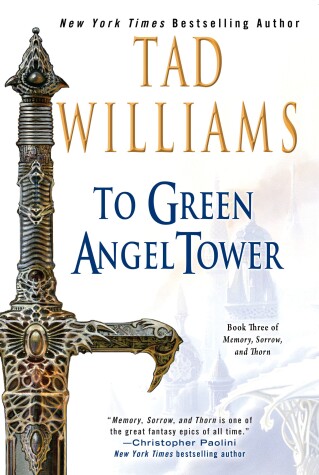
Kate (Blogging with Dragons)
Written on Jul 25, 2016
I read the Memory, Sorrow, and Thorn series for over a year, in between other books. I put off reading the last book in the series because I simply didn’t want this epic series to end. This was a huge change from when I initially began reading the series and barely made it through the first book, The Dragonbone Chair, because I found it so boring. I hated the main character Simon, whom I still haven’t really learned to like despite all of his heroic deeds (plus anyone who slays a dragon is dumb in my book—dragons are for riding into battle, etc.), and couldn’t find his life as a scullion at all worth my attention. But knowing that these books served as inspirations for George R.R. Martin for A Song of Ice and Fire, I kept pushing forward. And boy, was I glad I did.
The world building in this series is rich and complex, with the sense of impending doom surrounding three mystical swords, which decide the fate of the world, inescapable. The characters are flawed; Prince Josua is depressed and indecisive, the hero Simon attention-seeking and selfish, the Princess Miramele is snobbish and impulsive, and her father the evil King Elias, both sympathetic and utterly detestable. Pyrates, the dark sorcerer is the impetus for the end of the world, and is a repugnant evil villain, swathed in red robes and wielding magic and mystery from which all of the characters fear and cringe. Pyrates successfully ensnares King Elias with false promises in the very beginning, and plunges the world into ever-encroaching chaos. The evil beings the Norns that serve Pyrates are utterly chilling, the gardenborn Sithi majestic, and the League of Scrolls utterly joinable, what with its brilliant members who are dedicated to researching and deciphering the forces at work in the world of Osten Ard.
I was sad to read the last book, for I didn’t want to leave the world and its complex characters. However, in finally reading it, I was rewarded with my favorite book in the series. It was full of not only action, strife, and even romance, but also the eerie clashes between the Sithi and their evil counterparts, the Norns, which were fought via haunting songs, and even the final battle with the Storm King, Ineluki. Though I was disappointed with what I found to be the short appearance of the Storm King himself, he certainly made quite the entrance and impression. Pus, everything leading up to the confrontation was just as powerful as the pulse of the swords that drove Simon, Caramis, and Elias to their confrontation with the Elias, Pyrates, and the Storm King. Like our heroes, I was driven forward through the book and when I heard birds chirping and found it be 4am, I was stunned. But there was no way I was sleeping until I knew what happened!
The ending was a little too happy for my taste, and the final battle with Simon’s optimism defeating Ineluki, seemed far too simple. For Ineluki was so powerful, he turned the time of the world back to when he existed, allowing him entry into the body of long-suffering King Elias. In moments, the Storm King dissolved traitorous Pyrates, the most feared and powerful sorcerer of Osten Ard, into firey ash. So Simon simply defeating the Storm King with mere positive thoughts and sympathy, made me think of my similar disgust with Harry PotterView Spoiler »
Exaggerations aside, Simon did have some help from Miramele, who shot the white Sithi arrow into her father’s chest, hoping to put him out of his misery and freeing him from the Storm King’s possession at last. I was very happy and found it fitting that she played such a role, as she toiled as much as anyone in the hopes of saving the world and her father. Besides, I’ve always loved heroines who don’t sit back and leave the work to the men, and Miramele is the absolute definition of this, even to a fault, often putting herself and others around her in danger, but capably handling herself and her bow when things get rough.
And ultimately, I was glad to witness many characters find their own happy endings after all that they endured. I was most thrilled that Prince Josua found a way out of having to rule and could finally find his own happiness as a presumed “dead man.” I was also overjoyed that Jir’iki and Aditu survived their own battle with Utuk’ku, the Norn Queen, which was just as hauntingly and beatifically described as Simon’s own battle with Ineluki. It was also a wonderful, heartfelt touch for Cadrach to finally find his own redemption through sacrifice, which allows Simon, Miramele, and Binabik to escape the crumbling castle. Truly and heart-twistingly well done.
But conversely, I found it a little too convenient that Simon just happened to be the lost and rightful heir to the throne and that he could marry his beloved Miramele and finally receive the recognition and hero worship he so desperately craved. Though the stage had been set for Simon’s heritage throughout the series, I would have preferred that he live with the Sithi or Binabik for several years to help them rebuild or record all of what had transpired in Green Angel Tower, only to reemerge later, even more mature. Likewise, I would have preferred that Miramele be forced to take the throne and right her father’s wrongs on her own, as she was a strong-willed and capable woman. She could have fallen in love with Simon after his reappearance. It just seemed too much of a fairy tale ending for me after so much suffering and destruction.
But not all of the characters met similarly happy fates. I was quite sad that Maegwin and Eolair did not get their much longed for love. I was really rooting for Maegwin throughout the series, even after her descent into madness, and felt that she and Eolair deserved their happy ending more than Simon and Miramele. However, I was pleased how Simon made known to a bereaved Eolair of Maegwin’s sacrifice, which not only saved his life at the cost of her own, but also allowed him to move forward to defeat Ineluki. It was a touching tribute and showed Simon’s growth as a character. Though I could never quite like Simon, he was a very well-developed and flawed character, like the rest of the cast, and I am confident that Miramele, his queen, will be able to keep his “Mooncalf”-ness or childishness in line.
Though the series was over and the reader was able to glimpse the world a year after the final battle, I was still extremely interested in Osten Ard. For instance, what would become of Josua’s twins? After all, Aditu gave such a curious prophecy concerning them! I want to know more and I am hoping for another series where this question is answered! Plus, I would love to revisit the world of Osten Ard all over again. And with the Norn Queen still living, Josua’s twins growing, and the League of Scrolls still going strong, I imagine that author Tad Williams isn’t quite done with this world yet and I will be more than ready when he revisits it!
